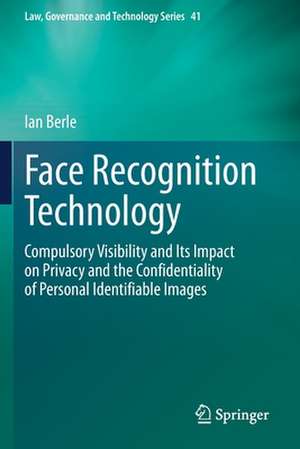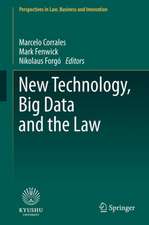Face Recognition Technology: Compulsory Visibility and Its Impact on Privacy and the Confidentiality of Personal Identifiable Images: Law, Governance and Technology Series, cartea 41
Autor Ian Berleen Limba Engleză Paperback – 12 mar 2021
The book reviews American, UK and European case law concerning privacy and confidentiality, the effect each case has had on the developing jurisprudence, and the ethical issues involved. As such, it offers a valuable resource for students of ethico-legal fields, professionals specialising in image rights law, policy-makers, and liberty advocates and activists.
| Toate formatele și edițiile | Preț | Express |
|---|---|---|
| Paperback (1) | 778.01 lei 6-8 săpt. | |
| Springer International Publishing – 12 mar 2021 | 778.01 lei 6-8 săpt. | |
| Hardback (1) | 691.10 lei 3-5 săpt. | +21.74 lei 7-13 zile |
| Springer International Publishing – 12 mar 2020 | 691.10 lei 3-5 săpt. | +21.74 lei 7-13 zile |
Din seria Law, Governance and Technology Series
- 18%
 Preț: 950.33 lei
Preț: 950.33 lei - 24%
 Preț: 645.13 lei
Preț: 645.13 lei - 20%
 Preț: 691.10 lei
Preț: 691.10 lei - 20%
 Preț: 574.08 lei
Preț: 574.08 lei - 20%
 Preț: 879.83 lei
Preț: 879.83 lei - 20%
 Preț: 878.78 lei
Preț: 878.78 lei - 15%
 Preț: 720.23 lei
Preț: 720.23 lei - 18%
 Preț: 1122.56 lei
Preț: 1122.56 lei - 18%
 Preț: 1130.27 lei
Preț: 1130.27 lei - 15%
 Preț: 642.83 lei
Preț: 642.83 lei - 18%
 Preț: 950.52 lei
Preț: 950.52 lei - 18%
 Preț: 1009.85 lei
Preț: 1009.85 lei - 18%
 Preț: 1115.14 lei
Preț: 1115.14 lei - 15%
 Preț: 653.14 lei
Preț: 653.14 lei - 18%
 Preț: 949.23 lei
Preț: 949.23 lei - 18%
 Preț: 1014.76 lei
Preț: 1014.76 lei - 15%
 Preț: 638.43 lei
Preț: 638.43 lei - 18%
 Preț: 1124.30 lei
Preț: 1124.30 lei - 18%
 Preț: 1124.60 lei
Preț: 1124.60 lei - 18%
 Preț: 999.45 lei
Preț: 999.45 lei - 18%
 Preț: 892.42 lei
Preț: 892.42 lei - 15%
 Preț: 640.37 lei
Preț: 640.37 lei - 18%
 Preț: 947.35 lei
Preț: 947.35 lei - 20%
 Preț: 340.32 lei
Preț: 340.32 lei - 18%
 Preț: 1692.20 lei
Preț: 1692.20 lei - 18%
 Preț: 954.93 lei
Preț: 954.93 lei - 24%
 Preț: 789.37 lei
Preț: 789.37 lei -
 Preț: 397.59 lei
Preț: 397.59 lei - 20%
 Preț: 876.60 lei
Preț: 876.60 lei - 20%
 Preț: 652.41 lei
Preț: 652.41 lei - 18%
 Preț: 900.49 lei
Preț: 900.49 lei - 18%
 Preț: 941.50 lei
Preț: 941.50 lei -
 Preț: 392.97 lei
Preț: 392.97 lei
Preț: 778.01 lei
Preț vechi: 948.79 lei
-18% Nou
Puncte Express: 1167
Preț estimativ în valută:
148.88€ • 159.20$ • 124.13£
148.88€ • 159.20$ • 124.13£
Carte tipărită la comandă
Livrare economică 17 aprilie-01 mai
Preluare comenzi: 021 569.72.76
Specificații
ISBN-13: 9783030368890
ISBN-10: 3030368890
Ilustrații: XXIII, 202 p. 4 illus.
Dimensiuni: 155 x 235 mm
Greutate: 0.33 kg
Ediția:1st ed. 2020
Editura: Springer International Publishing
Colecția Springer
Seria Law, Governance and Technology Series
Locul publicării:Cham, Switzerland
ISBN-10: 3030368890
Ilustrații: XXIII, 202 p. 4 illus.
Dimensiuni: 155 x 235 mm
Greutate: 0.33 kg
Ediția:1st ed. 2020
Editura: Springer International Publishing
Colecția Springer
Seria Law, Governance and Technology Series
Locul publicării:Cham, Switzerland
Cuprins
Introduction.- What is Face Recognition Technology?.- Some Ethical and Legal Issues of FRT.- Surveillance Surveyed.- Autonomy, Liberty and Privacy.- Compulsory Visibility?.- The Law and Data Protection.- The Law and Surveillance.- State Paternalism and Autonomy.- State Paternalism and Data.- The Future of Face Recognition.- Conclusion.
Notă biografică
Ian Berle is the specialist assessor for the ‘Legal & Ethical’ module of Staffordshire University’s medical illustration certificate & diploma course. A former Head of Medical Illustration at Barts NHS Health Trust (1982-2008), he holds post-graduate degrees in bioethics and privacy law, and wrote an MPhil thesis on Face Recognition Technology and its effects on privacy and confidentiality. His recent work concerns how the right to one’s own image might be adequately protected, which this work also seeks to address.
Textul de pe ultima copertă
This book examines how face recognition technology is affecting privacy and confidentiality in an era of enhanced surveillance. Further, it offers a new approach to the complex issues of privacy and confidentiality, by drawing on Joseph K in Kafka’s disturbing novel The Trial, and on Isaiah Berlin’s notion of liberty and freedom. Taking into consideration rights and wrongs, protection from harm associated with compulsory visibility, and the need for effective data protection law, the author promotes ethical practices by reinterpreting privacy as a property right. To protect this right, the author advocates the licensing of personal identifiable images where appropriate.
The book reviews American, UK and European case law concerning privacy and confidentiality, the effect each case has had on the developing jurisprudence, and the ethical issues involved. As such, it offers a valuable resource for students of ethico-legal fields, professionals specialising in image rights law, policy-makers, and liberty advocates and activists.
The book reviews American, UK and European case law concerning privacy and confidentiality, the effect each case has had on the developing jurisprudence, and the ethical issues involved. As such, it offers a valuable resource for students of ethico-legal fields, professionals specialising in image rights law, policy-makers, and liberty advocates and activists.
Caracteristici
Discusses face recognition technology and the need for improved rights to personal identifiable images Draws on a variety of sources from philosophy and law and applies them from a photographer’s unique perspective Offers a reinterpretation of privacy and property rights





















